A sharp and painful sensation in the lower abdomen, the desire to urinate - cystitis gives unpleasant symptoms, the first signs of the disease in women are like this.This is an inflammation process that occurs in the inner wall of the bladder.The causes and conditions for the development of the disease in women are more frequent than men.
What is cystitis
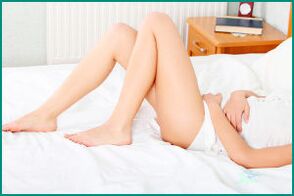
The bladder is a muscle organ located in the pelvic cavity, the upper part, which collects urine before leaving through the urethra.This is how the terminal part of the urinary system is organized in the male and female body.The bladder cavity gradually fills through two ureter, which is a conductive path for fluid filtered from the kidneys.When the organ is filled with more than half of its volume, the person feels the desire to urinate.This is an unconditional reflex.
The internal environment of the urinary system is sterile, just like urine released in healthy people.The intake of infectious agents that are capable of multiplying under these conditions, as well as chemical and allergenic irritants lead to the development of cystitis, the first symptoms that will immediately indicate disruption in the chain.
Inflammation, allergies, and chemical irritation in the bladder can be caused by a variety of causes.The ways in which the irritants penetrate the inside are also different.
For women, the better roads are more typical, that is, pathogens enter the cavity, rising from the external urethra.
The same type of cystitis can be found in young children, especially infants, who do not have proper home care, or pathology of postpartum period, organic disorders.
Causes of events in women
It is necessary to understand the difference between the causes and conditions that begin the signs of cystitis in women.The cause is infectious agents and non -communicable factors.The first group includes:
- opportunistic microorganisms;
- pathogenic microorganisms;
- Agent causes sexually transmitted diseases.
Opportunistic microbes are called because they exhibit their vicious properties when exposed to appropriate conditions.Usually, the agent of this disease is a representative of normal biochenosis of the vagina or intestinal microflora.They are always present on the skin of the genital organs and act as protective barriers.Once a girl becomes hypothermic and takes treatment with antibiotics, which suppresses not only pathogenic, but also ordinary flora, the number of microbiokenosis representatives grows rapidly.When they reach a critical mass, they stop performing the function of the barrier, changing the pH value of the mucous membrane, and they are the cause of the development of inflammation.
In addition, by multiplying, microbes spread to their unusual areas, for example, urethra, bladder.Pathogeny pathogens are sources of inflammatory reactions during hospitals in any hospital -but most often, one can be infected in maternity hospitals and the Department of Obstetrics and Gynecology.It is in it that microorganisms that cause nosocomial infections circulate.
These pathogens are different from the usual in the process of recurrent repetition through weak organisms, they acquire new features, for example:
- Salmonella, which is spread by air droplets;
- resistance to large amounts of antibiotics;
- immunity to broad-spectrum antibacterial drugs;
- The ability to use incredible ingredients for this species as a nutritional substrate.

Clinical courses of cystitis caused by pathogen and opportunistic microorganisms that gain new properties during development are characterized by painful manifestations.It is more difficult to fight the cystitis, as various antibacterial drugs are narrowed.
Sexual diseases cannot occur separately from the urinary organs due to the uniqueness of their anatomical structure.The most common among them are gonorrhea, trichomonas urethritis and cystitis.Through the urethra, which in women is wider and shorter than men, bacteria enter the bladder cavity and begin to breed there.
The original cause of non -contagious is divided into chemical and allergic factors.Chemical irritation can enter the blood, filtered by the kidneys.This can be a medical substance, a dangerous agent of industrial properties, food components.
Allergic agents are evidence of deep oppression of the immune system, which reacts with hypersensitivity to common materials.
Additional conditions that contribute to the development of inflammation are factors such as: hypothermia, wearing synthetic pants, neglect of personal hygiene rules, acute and chronic gynecological disease, childbirth, eating annoying foods, pregnancy.
The early signs
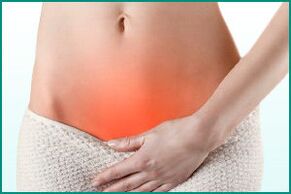
The first signs of cystitis in women already need treatment from the specialist and the patient's attention to the body.You can suspect the development of inflammation in the bladder by detecting the main syndrome:
- continuous itching in the external genital area;
- appearance of release from the urethra;
- painful, troubling pain after urination;
- pain along the urethra;
- increased encouragement to go to the toilet;
- Change of color, urine clarity, visible sediment appearance.
If you do not pay the right attention and do not treat the disease, the first symptoms gradually worsen and acute disease becomes chronic.
Progressive pathology
The medical history of patients with chronic cystitis can be quite large if the therapy is ignored or additional rules are not followed.Acute symptoms quickly losing their character and echoing, no longer causing significant discomfort.
But there are some signs of inflammation development:
- the addition of secondary infections in the kidneys;
- The severity of the infection is accompanied by fever;
- The general situation is worsening;
- The amount of urine released is small;
- Urine has a strong, cloudy, and may be mixed with pus or blood.
Chronic cystitis does not occur separately;It is complicated by the process of inflammation in the kidneys and gynecological pathology.
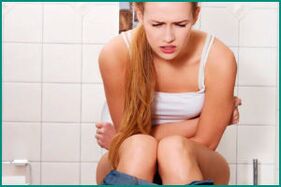
The body's resistance gradually decreases, other organ infections cause the severity of cystitis and pass with increased body temperature, general intoxication, severe weakness and malaise.
The urge to urinate is frequent, but the amount of fluids produced is small.This is because it annoys the bladder receptors too much due to the changing pH balance and pathological impurities.
Urine extraction is painful, spasmodic pain does not allow rest even at night.
The suprapubic area is tense, the palpation of the abdominal muscles in the lower abdomen is difficult.
Urine has an unpleasant and unclear odor.When you look at it, you can see the sediment falling to the bottom.
Signs of classic acute and chronic cystitis
Acute processes take place for the first time after contact with infectious agents, chemicals or allergens.Symptoms are clear and obvious: sharp pain when urinating, uncomfortable emptying of the bladder, lower abdominal pain, itching and burning at the urethra.There may be short -term rising temperatures, nausea or weaknesses, loss of appetite, and there may be associations with worsening symptoms after drinking annoying foods or drinks.
Chronic pathology is characterized by the elimination of symptoms, the presence of persistent discomfort in the suprapubic region, and pain.In the remission stage, the patient is feeling well.Exacerbation occurs after hypothermia, the use of irritating food or drinks, or repeated touches with allergens.
Type of cystitis in women
Inflammation of the bladder is classified according to various criteria.
The main types of cystitis include the following:
- by the nature of the process: acute or chronic;
- Because of the incident: bacteria, chemical or allergic;
- By related factors: after childbirth, secondary, after surgery.
Postoperative cystitis occurs after abortion, delivery by the cesarean section, and urine is released through the catheter.It is a medical instrument that can be a source of infection.
Characteristics of -after -child cystitis
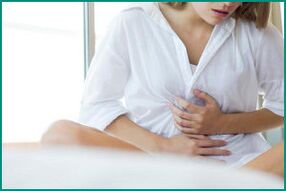
The postpartum period requires the attention and monitoring of women after childbirth, especially at home.Compliance with the regular hygiene regulations and urinary regime will help prevent possible complications of the period after childbirth and the addition of urinary tract infections.
After childbirth cystitis occurs in the same way as any other, but the treatment is difficult because not all medications can be taken by a nursing woman.In addition, this period is characterized by the presence of damage to the external genitals, which makes it difficult to urinate and use regular toilets.
Severe forms of the disease rarely develop, as the treatment of cystitis does not cause significant difficulties.But often we need to deal with a chronic form that is difficult to correct with medicines if the causative agent is multidrug resistant microorganisms.
Diagnostics
Usually it does not cause difficulties after taking comprehensive history, urine tests, and patient examination.The analysis results reveal the deviation from the norm: reducing specific gravity, changed pH levels, presence of blood pathological impurities, leukocytes, sediment, veins and oxalate crystals.
If necessary, ultrasound examinations and X-ray contrast images are prescribed to explain the etiology of the disease.
Treatment
It is important to be comprehensive or chronic acute cystitis.The use of different therapeutic methods at the same time contributes to the speed of the patient.
The main therapeutic agent is:
- antimicrobial tablets;
- anti-inflammatory drugs;
- analgesics and antispasmodic;
- physiotherapy (in remission);
- diet;
- Traditional methods.
Medicines for the treatment of cystitis are prescribed by a specialist.Anti-inflammatory drugs are preferred than non-steroidal drugs;They have antispasmodic and analgesic activities.
The diet involves excluding sour, citrus, spicy diets that have an annoying effect.In this case, drink at least two liters of fluid daily to clean the bladder.
People's recipe
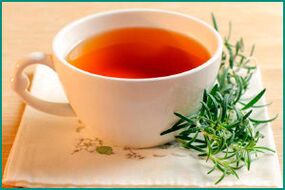
Alternative medicine has gained extensive experience in the treatment of urological infections.The recipe has many positive reviews, which confirm the effectiveness of the method.But they can only be used in combination with drug treatment.
Good results are obtained by drinking parsley root decoctions, chamomile, and lingonberry leaf tincture.Drinking lingonberry juice has an excellent sanitizing effect.The quality of healing "bear ears" and cranberries have long been known.You can prepare the following composition and take it three times a day after meals:
- Take dried herbs rosemary, lovage, centaury, and hips rise in equal proportions;
- Pour boiling water for 30 minutes;
- Boil in a water bath for 20 minutes;
- Leave for 30 minutes;
- Tensions and drinks as above.
It is a contraindication for drinking alcohol, strong drinks, or smoke during treatment.
Prevention
Steps to prevent cystitis are simple but effective.It is necessary to follow the rules of care, sexual culture, regularly change hygiene and underwear products, avoiding hypothermia, and the use of annoying food and beverages.
























